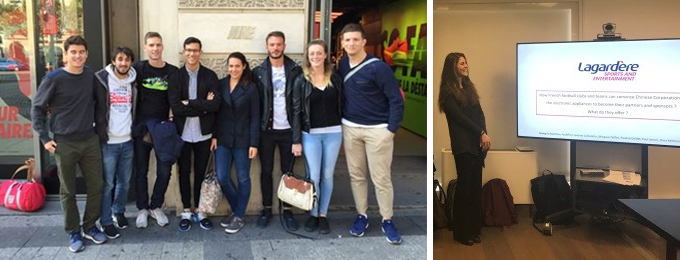Search the latest and greatest job opportunities in sport

Passionate about sports? Want to pursue a sports management degree at a top management school? If you’re planning to invest precious time and money into further education in sports management, you want to ensure you choose the school that best suits your specific needs.
To make sure the master’s programme will help you get closer to your dream of working in the sports industry, we share 5 important factors to consider in your decision-making process.
1. Does the school have professional connections within the sports industry?
When choosing a sports management school, it’s important to make sure that the programme has strong links to the sports industry . From day one, you will need to start building your professional network in the sports industry if you want to land those top internships and jobs when taking your first steps into the sports industry. Look to see if the masters in sports management features courses taught by senior professionals in the sports industry, organises company visits to sports organisations or runs specific career or recruitment events in the sports industry, allowing you to meet and network with professionals. The master’s programme is the first step towards your sports career so make the most of the school’s vital resources to help you take your first step into this competitive industry.

2. Does the programme have an international focus?
Whether you get the opportunity to study sports management in several countries with an international cohort, gain learning experiences abroad, or complete an internship outside of your home country, obtaining an international outlook of the sports industry is a major selling point on your resume. More than ever, global sports organisations need experienced managers with a global awareness of the sports industry, in order to navigate the constant and rapid waves of innovation and ever-changing customer needs to develop new growth opportunities.
In particular, gaining international experience in emerging sports markets such as Brazil, Russia, India, China and the Middle East will be of particular interest for sports industry recruiters. These regions are currently the fastest growing markets in the industry, so experience in sports management in these countries will help put your resume at the top of the pile when applying for jobs in the sector.

3. Does the programme feature practical projects in the sports industry?
Studying sports management is one thing, but putting your knowledge into practice with real-life sports industry projects is essential to develop your capability to turn an idea into a tangible solution, solve problems, think innovatively and work productively in a multi-cultural team; skills you will need as a future manager in the sports industry.
Look for sports programmes that feature practical industry projects and missions with organisations in the sports industry. This will not only help you develop your management skills and your ability to project yourself professionally to a client, it will also enable you to develop your professional network in the sports industry; something you can call upon when looking for internships and jobs.

4. Is the programme well respected in the sports industry?
When weighing up different programmes in sports management, it’s important to understand the perception of the programme in the sports industry itself. Consider the official rankings, but base these on whether the programme is a good fit for you personally. Look for programmes in partnership with clusters or sports companies. Furthermore, it’s a good idea to speak to recruiters in companies you’d like to work for in the future. This will give you an idea of whether studying in this particular sport management programme will give you a real advantage over candidates without this education, therefore ensuring the investment of your time and money will be worthwhile.

5. Does the programme include an internship?
Knowledge of the sports industry is worth little if you can’t prove you have experienced the real-life challenges of working in the sports industry. If the programme includes an internship, utilise the school’s professional connections in the sports industry and tour the alumni network for graduates working in the sports field for internship opportunities. Look to see which companies in the sports industry previous graduates of the programme interned with, and speak to previous graduates to understand how they found these opportunities.
If the sport management school doesn’t feature an internship, consider whether you can complete one before or after the programme to increase your employability. You can also demonstrate industry experience through voluntary work, work shadowing or extra-curricular activities, so be tenacious when it comes to seeking out and making the most of the opportunities available to you.
6. Are the courses innovative and targeting key challenges of the industry?
The sports industry is an ever-growing sector continuously facing new challenges due to new economic and social trends and it’s paramount that you find the sports programme able to help you grasp these market tendencies. For example digitalisation and the big data phenomenon are becoming central to the consumer experience within the sports industry. Furthermore understanding lifestyle and markets will help you get a deep understanding of how companies and brands can analyze and connect with consumer markets by understanding behavior patterns, values, opinions, activities etc.

Jump-start your sports management career coming next September
Through its MSc in Sports Industry Management, emlyon business school takes into account the necessary components that will help you boost your career in sports management.

What’s the latest news in the programme?
Follow the programme on Facebook (@MScInSports) and Twitter (@EMLYONMScSports)
- Keep up with the programme community on the blog
- Discover the MSc in Sports Industry Management website
Search the latest and greatest job opportunities in sport